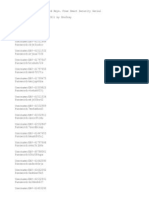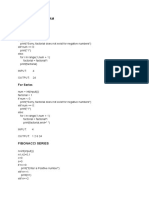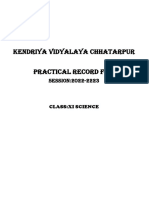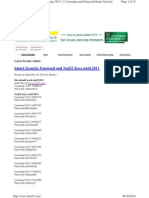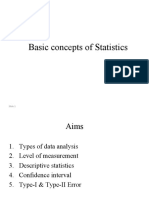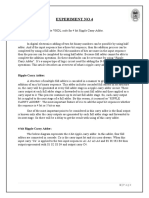Assignment 1 Python
Uploaded by
Aashish AryaAssignment 1 Python
Uploaded by
Aashish AryaIn [1]: #question 1
num = int(input("print multiplication table for number?"))
def multiplication_table(num):
'''this is a function for multiplication table
'''
for j in range(1, 11):
print(num, 'x', j, '=', num * j)
multiplication_table(num)
print multiplication table for number?5
5 x 1 = 5
5 x 2 = 10
5 x 3 = 15
5 x 4 = 20
5 x 5 = 25
5 x 6 = 30
5 x 7 = 35
5 x 8 = 40
5 x 9 = 45
5 x 10 = 50
In [2]: #question 2
def prime_number(val):
'''fucntion for finding prime number'''
for n in range(2,val):
if val % n == 0:
return False
break
else:
return val
for i in range(2,1001):
num1 = i
num2 = i+2
if prime_number(num1) and prime_number(num2):
print("(", num1 ,",", num2, ")")
( 3 , 5 )
( 5 , 7 )
( 11 , 13 )
( 17 , 19 )
( 29 , 31 )
( 41 , 43 )
( 59 , 61 )
( 71 , 73 )
( 101 , 103 )
( 107 , 109 )
( 137 , 139 )
( 149 , 151 )
( 179 , 181 )
( 191 , 193 )
( 197 , 199 )
( 227 , 229 )
( 239 , 241 )
( 269 , 271 )
( 281 , 283 )
( 311 , 313 )
( 347 , 349 )
( 419 , 421 )
( 431 , 433 )
( 461 , 463 )
( 521 , 523 )
( 569 , 571 )
( 599 , 601 )
( 617 , 619 )
( 641 , 643 )
( 659 , 661 )
( 809 , 811 )
( 821 , 823 )
( 827 , 829 )
( 857 , 859 )
( 881 , 883 )
In [8]: #question 3
n = 64
while n % 2 == 0:
print(2)
n = n / 2
for i in range(3, int(n+1)):
while n % i == 0:
print(i)
n = n / i
2
2
2
2
2
2
In [37]: #question 4
#implimenting the formula of permutation and combination
def factorial(n):
if n == 0 or n == 1:
return 1
else:
return n * factorial(n-1)
#formula for factorial is n! / (n-r)!
n = 5
r = 2
num_of_permutation = factorial(n) / factorial(n-r)
print(num_of_permutation)
num_of_combination = factorial(n)/ (factorial(r) * factorial(n-r))
print(num_of_combination)
factorial(n)/ (factorial(r) * factorial(n-r)) == num_of_permutation / factorial(r)
20.0
10.0
Out[37]: True
In [108]: #question 5
def binary_to_decimal(num):
if num > 1:
binary_to_decimal(num // 2)
print(num % 2)
binary_to_decimal(int(input("enter the postive_decimal_number")))
enter the postive_decimal_number88
1
0
1
1
0
0
0
In [15]: #question 6
def cubesum (a):
lst = [int(i) for i in str(a)]
new_lst = [(e ** 3)for e in lst]
return sum(new_lst)
a = 370
c = cubesum(a)
def isarmstrong (c):
if a == c:
print("is armstrong")
else:
print("not armstrong")
isarmstrong(c)
is armstrong
In [101]: #question 7
def prodDigits(lst):
lst = [int(i) for i in str(a)]
product = 1
for e in lst:
product *= e
print(product)
a = input("input a number :")
prodDigits(a)
input a number :48
32
In [7]: #question 8
def prodDigits(n):
product = 1
while n >= 1:
product = product * (n % 10)
n = n // 10
return product
def MPersistense (n):
product = 1
count = 0
while n >= 9:
n = prodDigits(n)
count = count + 1
return n, count
a = input("input the number")
n = int(a)
print("MDR and MPR of number are ",":", str(MPersistense(n)), "respectively")
input the number341
MDR and MPR of number are : (2, 2) respectively
In [114]: #question 9
def sumpdivisors(a):
sum = 0
for i in range(1,a):
if a % i == 0:
print(i)
sum = sum + i
return sum
a = int(77)
sumpdivisors(a)
1
7
11
Out[114]: 19
In [69]: #question 10
def sumpdivisors(i):
sum = 0
for a in range(1,i):
if i % a == 0:
sum = sum + a
return sum
for i in range(1, 500):
if i == sumpdivisors(i):
print(str(i), "is a perfect number")
6 is a perfect number
28 is a perfect number
496 is a perfect number
In [107]: #question 11
def sumpdivisors(i):
sum = 0
for a in range(1,i):
if i % a == 0:
sum = sum + a
return sum
def amicable_num(k):
for i in range(1,k):
n = sumpdivisors(i)
if sumpdivisors(n) == i and n != i:
print("(", str(i), "," ,str(n),")", "is amicable number")
k = 3000
amicable_num(k)
( 220 , 284 ) is amicable number
( 284 , 220 ) is amicable number
( 1184 , 1210 ) is amicable number
( 1210 , 1184 ) is amicable number
( 2620 , 2924 ) is amicable number
( 2924 , 2620 ) is amicable number
In [67]: #question 12
def odd_numbers(n):
while n % 2 != 0:
return n
n = [2,31,9,-7,1,2,6,7]
list(filter(odd_numbers, n))
Out[67]: [31, 9, -7, 1, 7]
In [98]: #question 13
def cube(n):
i = 1
while n!=0:
return n**3
if n == 0:
return 0
n = [2,3,5,9,8,-4,0]
length = len(n)
list(map(cube, n))
Out[98]: [8, 27, 125, 729, 512, -64, 0]
In [100]: #question 14
def even_numbers(n):
while n % 2 == 0:
return n
def cube(n):
i = 1
while n!=0:
return n**3
if n == 0:
return 0
n = [2,3,5,8,9,-3,-4,6,-6,0]
new_list = list(filter(even_numbers,n))
list(map(cube,new_list))
Out[100]: [8, 512, -64, 216, -216]
In [ ]:
You might also like
- Most Common Interview Questions and Answers93% (28)Most Common Interview Questions and Answers3 pages
- 50 Most Common Interview Questions and Answers95% (43)50 Most Common Interview Questions and Answers40 pages
- LETTER ASKING FOR FINANCIAL ASSISTANCE IN PAYING HOSPITAL BILLS (For Scribd)81% (79)LETTER ASKING FOR FINANCIAL ASSISTANCE IN PAYING HOSPITAL BILLS (For Scribd)2 pages
- Class 11 CBSE Computer Science General Practical67% (6)Class 11 CBSE Computer Science General Practical19 pages
- How To Piss Off A Narcissist Without Even Trying - An Upturned Soul PDF60% (5)How To Piss Off A Narcissist Without Even Trying - An Upturned Soul PDF20 pages
- Daily Lesson Plan in English Grade 7 (Quarter 3-Module 5)60% (5)Daily Lesson Plan in English Grade 7 (Quarter 3-Module 5)2 pages
- "Headhunter" Hiring Secrets: The Rules of The Hiring Game Have Changed - . - Forever! by Skip Freeman88% (8)"Headhunter" Hiring Secrets: The Rules of The Hiring Game Have Changed - . - Forever! by Skip Freeman346 pages
- Factorial Program: For Particular NumberNo ratings yetFactorial Program: For Particular Number17 pages
- Basic Python Programs by PST IT SOLUTIONSNo ratings yetBasic Python Programs by PST IT SOLUTIONS12 pages
- Combined_Library_Management_and_ExercisesNo ratings yetCombined_Library_Management_and_Exercises39 pages
- De Moiver's Theorem (Trigonometry) Mathematics Question BankFrom EverandDe Moiver's Theorem (Trigonometry) Mathematics Question BankNo ratings yet
- Thoughts and Feelings, 4th Edition - Sample Worksheets93% (30)Thoughts and Feelings, 4th Edition - Sample Worksheets11 pages
- Dos and Donts To Protect The Interest of Jobseekers100% (2)Dos and Donts To Protect The Interest of Jobseekers4 pages
- How To Get A Background Check and Credit Report On Anyone 201567% (6)How To Get A Background Check and Credit Report On Anyone 20153 pages
- Armida. Gioachino Rossini: Recordings 1 2 7No ratings yetArmida. Gioachino Rossini: Recordings 1 2 73 pages
- Research On Flexible Graphite-Copper Composited Electrical Grounding MaterialNo ratings yetResearch On Flexible Graphite-Copper Composited Electrical Grounding Material6 pages
- 1887 3248726-Advances in Botanical Research 97 2021 361No ratings yet1887 3248726-Advances in Botanical Research 97 2021 36125 pages
- Genetic Algorithm and Time Petri Net Are New Approaches For Path Planning and Co-Ordination Among Sub-Modules in A Mobile RobotNo ratings yetGenetic Algorithm and Time Petri Net Are New Approaches For Path Planning and Co-Ordination Among Sub-Modules in A Mobile Robot10 pages
- Name:: Number Snake - Division With HintsNo ratings yetName:: Number Snake - Division With Hints2 pages
- Digital Signal Processing: Filtering of Long Data SequenceNo ratings yetDigital Signal Processing: Filtering of Long Data Sequence1 page
- Geometry Unit: Congruence and Similarity: Manasquan High School Department: MathematicsNo ratings yetGeometry Unit: Congruence and Similarity: Manasquan High School Department: Mathematics5 pages
- Pre-Test: Answer The Following Questions Below0% (1)Pre-Test: Answer The Following Questions Below3 pages
- Work Immersion Learner'S Rating Sheet: ElementNo ratings yetWork Immersion Learner'S Rating Sheet: Element1 page






















